Western vs. Chinese Psychological Contracts in Collaboration
VerifiedAdded on 2023/04/21
|82
|20673
|342
Thesis and Dissertation
AI Summary
This dissertation explores the impact of psychological contracts and social exchange theory in collaborative economies, comparing Western approaches with those in China. It examines the unwritten mutual expectations between employers and employees, focusing on factors like trust, job satisfaction, and employee engagement within the hospitality industry. The research utilizes a mixed-methods approach, combining literature review, interviews with managers, and an online survey of employees to analyze the fulfillment of psychological contracts and its relationship with employee turnover. The study finds that employee trust is significantly dependent on psychological contracts, particularly concerning internal advancement and employer/employee obligations, while highlighting areas where employee engagement falls below moderate standards. Desklib provides access to this and other solved assignments.
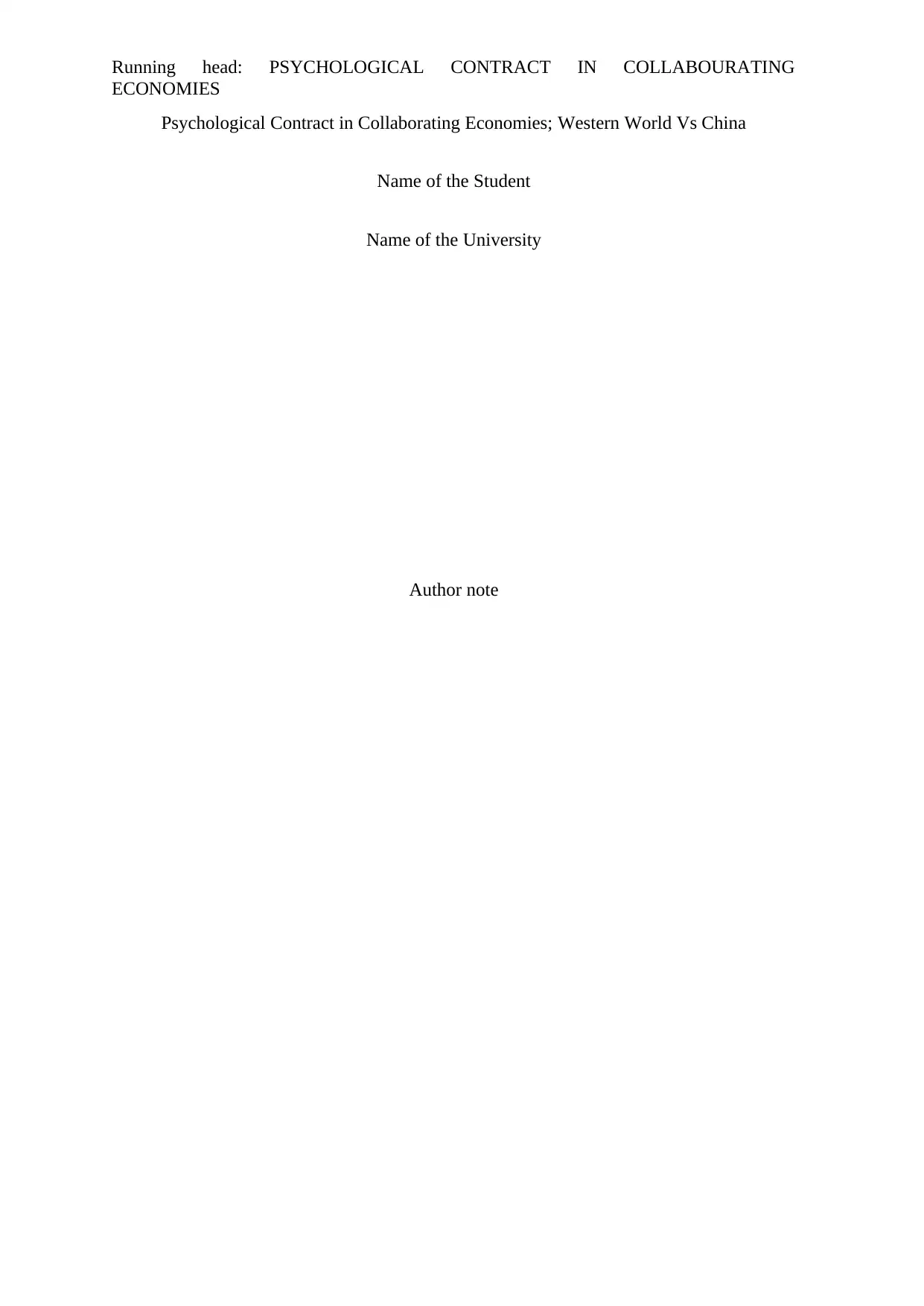
Running head: PSYCHOLOGICAL CONTRACT IN COLLABOURATING
ECONOMIES
Psychological Contract in Collaborating Economies; Western World Vs China
Name of the Student
Name of the University
Author note
ECONOMIES
Psychological Contract in Collaborating Economies; Western World Vs China
Name of the Student
Name of the University
Author note
Paraphrase This Document
Need a fresh take? Get an instant paraphrase of this document with our AI Paraphraser
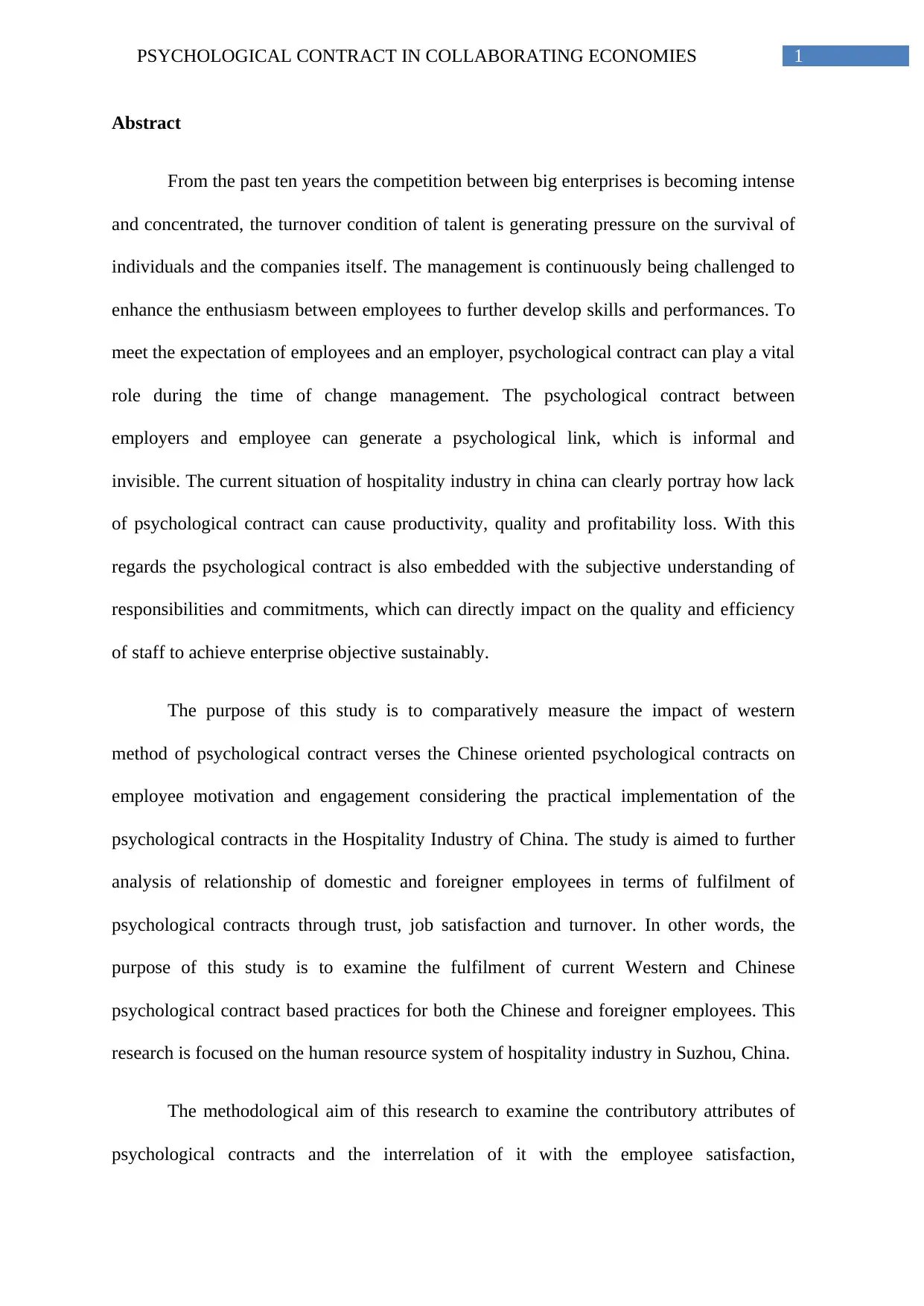
1PSYCHOLOGICAL CONTRACT IN COLLABORATING ECONOMIES
Abstract
From the past ten years the competition between big enterprises is becoming intense
and concentrated, the turnover condition of talent is generating pressure on the survival of
individuals and the companies itself. The management is continuously being challenged to
enhance the enthusiasm between employees to further develop skills and performances. To
meet the expectation of employees and an employer, psychological contract can play a vital
role during the time of change management. The psychological contract between
employers and employee can generate a psychological link, which is informal and
invisible. The current situation of hospitality industry in china can clearly portray how lack
of psychological contract can cause productivity, quality and profitability loss. With this
regards the psychological contract is also embedded with the subjective understanding of
responsibilities and commitments, which can directly impact on the quality and efficiency
of staff to achieve enterprise objective sustainably.
The purpose of this study is to comparatively measure the impact of western
method of psychological contract verses the Chinese oriented psychological contracts on
employee motivation and engagement considering the practical implementation of the
psychological contracts in the Hospitality Industry of China. The study is aimed to further
analysis of relationship of domestic and foreigner employees in terms of fulfilment of
psychological contracts through trust, job satisfaction and turnover. In other words, the
purpose of this study is to examine the fulfilment of current Western and Chinese
psychological contract based practices for both the Chinese and foreigner employees. This
research is focused on the human resource system of hospitality industry in Suzhou, China.
The methodological aim of this research to examine the contributory attributes of
psychological contracts and the interrelation of it with the employee satisfaction,
Abstract
From the past ten years the competition between big enterprises is becoming intense
and concentrated, the turnover condition of talent is generating pressure on the survival of
individuals and the companies itself. The management is continuously being challenged to
enhance the enthusiasm between employees to further develop skills and performances. To
meet the expectation of employees and an employer, psychological contract can play a vital
role during the time of change management. The psychological contract between
employers and employee can generate a psychological link, which is informal and
invisible. The current situation of hospitality industry in china can clearly portray how lack
of psychological contract can cause productivity, quality and profitability loss. With this
regards the psychological contract is also embedded with the subjective understanding of
responsibilities and commitments, which can directly impact on the quality and efficiency
of staff to achieve enterprise objective sustainably.
The purpose of this study is to comparatively measure the impact of western
method of psychological contract verses the Chinese oriented psychological contracts on
employee motivation and engagement considering the practical implementation of the
psychological contracts in the Hospitality Industry of China. The study is aimed to further
analysis of relationship of domestic and foreigner employees in terms of fulfilment of
psychological contracts through trust, job satisfaction and turnover. In other words, the
purpose of this study is to examine the fulfilment of current Western and Chinese
psychological contract based practices for both the Chinese and foreigner employees. This
research is focused on the human resource system of hospitality industry in Suzhou, China.
The methodological aim of this research to examine the contributory attributes of
psychological contracts and the interrelation of it with the employee satisfaction,
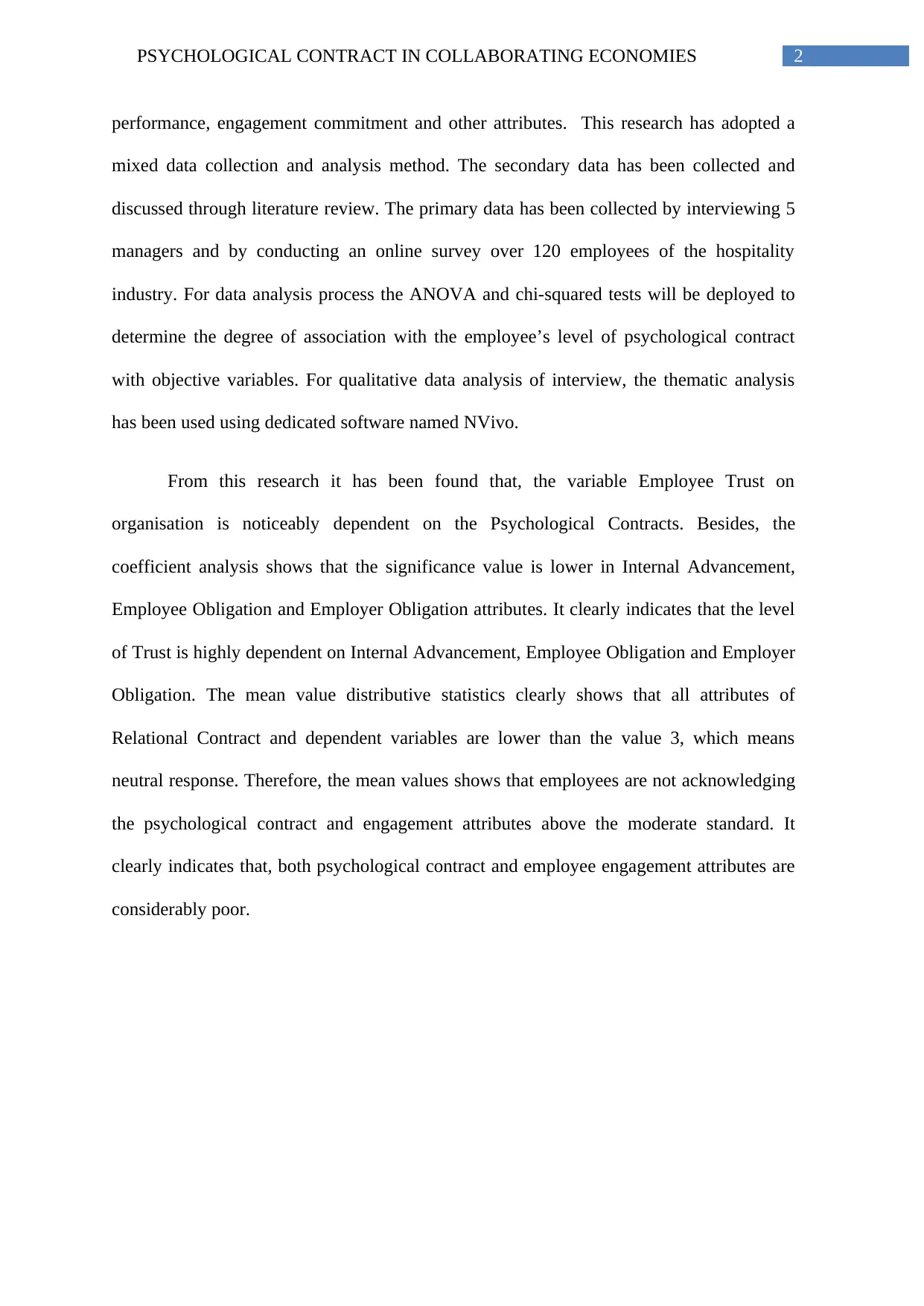
2PSYCHOLOGICAL CONTRACT IN COLLABORATING ECONOMIES
performance, engagement commitment and other attributes. This research has adopted a
mixed data collection and analysis method. The secondary data has been collected and
discussed through literature review. The primary data has been collected by interviewing 5
managers and by conducting an online survey over 120 employees of the hospitality
industry. For data analysis process the ANOVA and chi-squared tests will be deployed to
determine the degree of association with the employee’s level of psychological contract
with objective variables. For qualitative data analysis of interview, the thematic analysis
has been used using dedicated software named NVivo.
From this research it has been found that, the variable Employee Trust on
organisation is noticeably dependent on the Psychological Contracts. Besides, the
coefficient analysis shows that the significance value is lower in Internal Advancement,
Employee Obligation and Employer Obligation attributes. It clearly indicates that the level
of Trust is highly dependent on Internal Advancement, Employee Obligation and Employer
Obligation. The mean value distributive statistics clearly shows that all attributes of
Relational Contract and dependent variables are lower than the value 3, which means
neutral response. Therefore, the mean values shows that employees are not acknowledging
the psychological contract and engagement attributes above the moderate standard. It
clearly indicates that, both psychological contract and employee engagement attributes are
considerably poor.
performance, engagement commitment and other attributes. This research has adopted a
mixed data collection and analysis method. The secondary data has been collected and
discussed through literature review. The primary data has been collected by interviewing 5
managers and by conducting an online survey over 120 employees of the hospitality
industry. For data analysis process the ANOVA and chi-squared tests will be deployed to
determine the degree of association with the employee’s level of psychological contract
with objective variables. For qualitative data analysis of interview, the thematic analysis
has been used using dedicated software named NVivo.
From this research it has been found that, the variable Employee Trust on
organisation is noticeably dependent on the Psychological Contracts. Besides, the
coefficient analysis shows that the significance value is lower in Internal Advancement,
Employee Obligation and Employer Obligation attributes. It clearly indicates that the level
of Trust is highly dependent on Internal Advancement, Employee Obligation and Employer
Obligation. The mean value distributive statistics clearly shows that all attributes of
Relational Contract and dependent variables are lower than the value 3, which means
neutral response. Therefore, the mean values shows that employees are not acknowledging
the psychological contract and engagement attributes above the moderate standard. It
clearly indicates that, both psychological contract and employee engagement attributes are
considerably poor.
⊘ This is a preview!⊘
Do you want full access?
Subscribe today to unlock all pages.

Trusted by 1+ million students worldwide
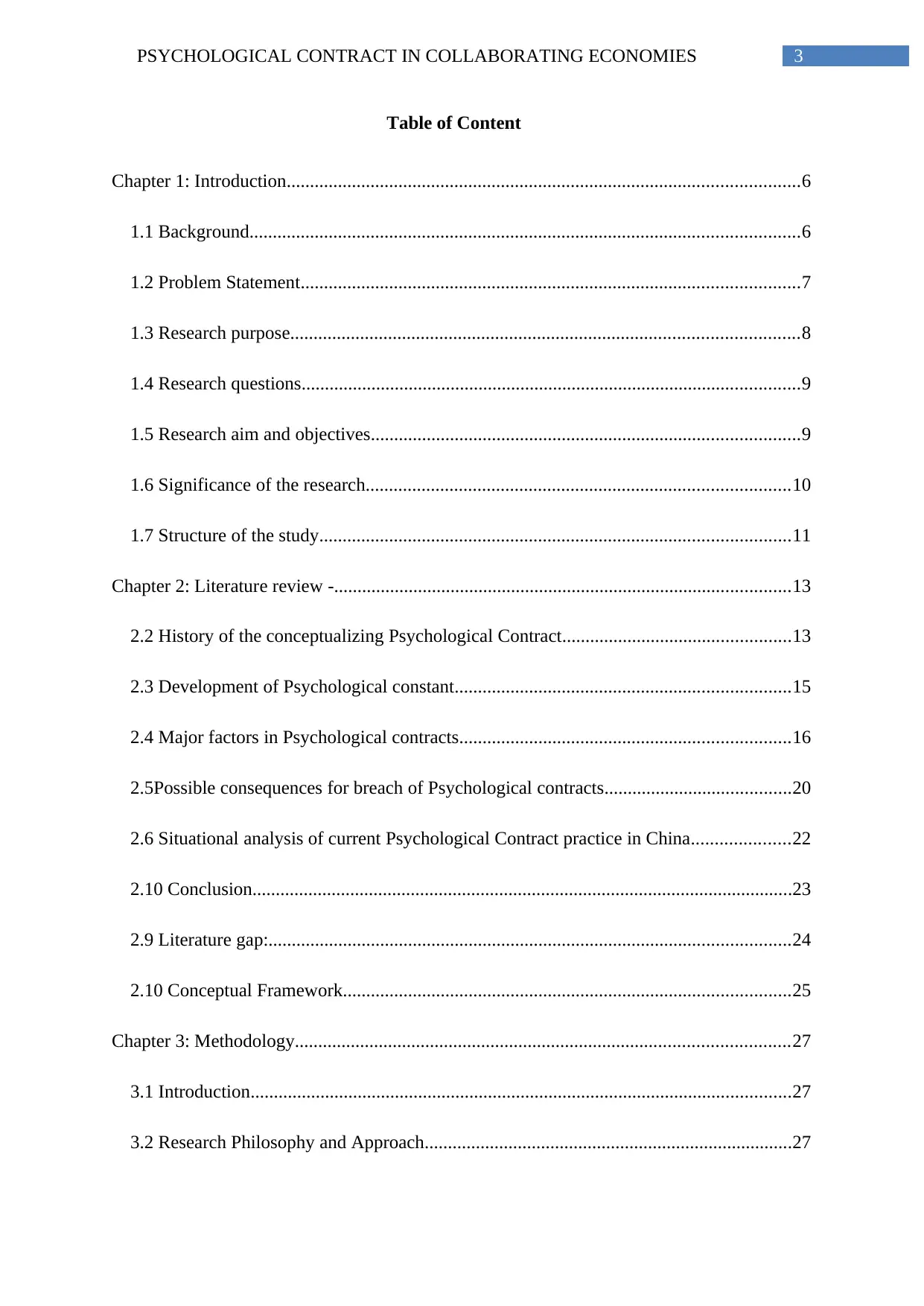
3PSYCHOLOGICAL CONTRACT IN COLLABORATING ECONOMIES
Table of Content
Chapter 1: Introduction..............................................................................................................6
1.1 Background......................................................................................................................6
1.2 Problem Statement...........................................................................................................7
1.3 Research purpose.............................................................................................................8
1.4 Research questions...........................................................................................................9
1.5 Research aim and objectives............................................................................................9
1.6 Significance of the research...........................................................................................10
1.7 Structure of the study.....................................................................................................11
Chapter 2: Literature review -..................................................................................................13
2.2 History of the conceptualizing Psychological Contract.................................................13
2.3 Development of Psychological constant........................................................................15
2.4 Major factors in Psychological contracts.......................................................................16
2.5Possible consequences for breach of Psychological contracts........................................20
2.6 Situational analysis of current Psychological Contract practice in China.....................22
2.10 Conclusion....................................................................................................................23
2.9 Literature gap:................................................................................................................24
2.10 Conceptual Framework................................................................................................25
Chapter 3: Methodology..........................................................................................................27
3.1 Introduction....................................................................................................................27
3.2 Research Philosophy and Approach...............................................................................27
Table of Content
Chapter 1: Introduction..............................................................................................................6
1.1 Background......................................................................................................................6
1.2 Problem Statement...........................................................................................................7
1.3 Research purpose.............................................................................................................8
1.4 Research questions...........................................................................................................9
1.5 Research aim and objectives............................................................................................9
1.6 Significance of the research...........................................................................................10
1.7 Structure of the study.....................................................................................................11
Chapter 2: Literature review -..................................................................................................13
2.2 History of the conceptualizing Psychological Contract.................................................13
2.3 Development of Psychological constant........................................................................15
2.4 Major factors in Psychological contracts.......................................................................16
2.5Possible consequences for breach of Psychological contracts........................................20
2.6 Situational analysis of current Psychological Contract practice in China.....................22
2.10 Conclusion....................................................................................................................23
2.9 Literature gap:................................................................................................................24
2.10 Conceptual Framework................................................................................................25
Chapter 3: Methodology..........................................................................................................27
3.1 Introduction....................................................................................................................27
3.2 Research Philosophy and Approach...............................................................................27
Paraphrase This Document
Need a fresh take? Get an instant paraphrase of this document with our AI Paraphraser
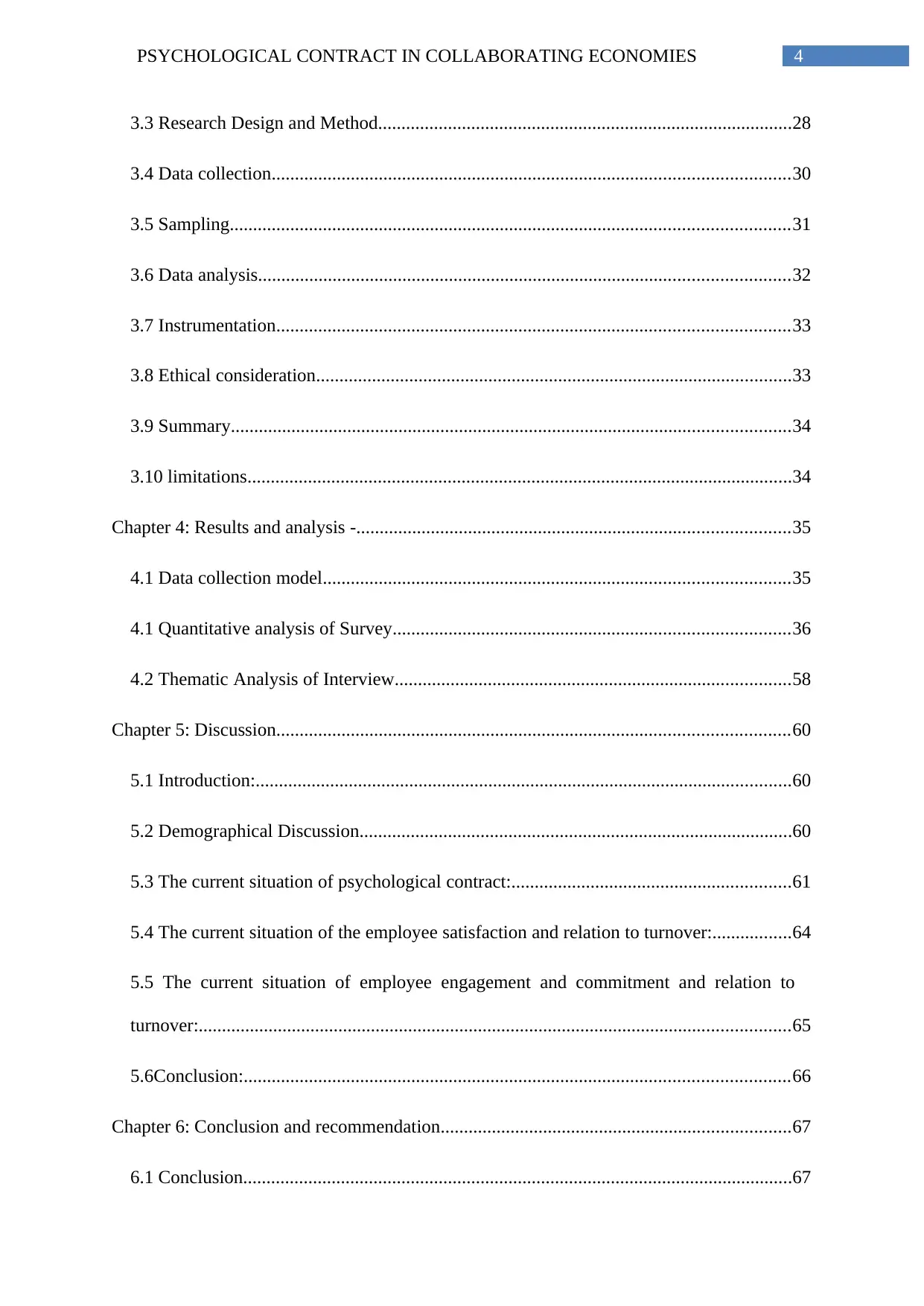
4PSYCHOLOGICAL CONTRACT IN COLLABORATING ECONOMIES
3.3 Research Design and Method.........................................................................................28
3.4 Data collection...............................................................................................................30
3.5 Sampling........................................................................................................................31
3.6 Data analysis..................................................................................................................32
3.7 Instrumentation..............................................................................................................33
3.8 Ethical consideration......................................................................................................33
3.9 Summary........................................................................................................................34
3.10 limitations.....................................................................................................................34
Chapter 4: Results and analysis -.............................................................................................35
4.1 Data collection model....................................................................................................35
4.1 Quantitative analysis of Survey.....................................................................................36
4.2 Thematic Analysis of Interview.....................................................................................58
Chapter 5: Discussion..............................................................................................................60
5.1 Introduction:...................................................................................................................60
5.2 Demographical Discussion.............................................................................................60
5.3 The current situation of psychological contract:............................................................61
5.4 The current situation of the employee satisfaction and relation to turnover:.................64
5.5 The current situation of employee engagement and commitment and relation to
turnover:...............................................................................................................................65
5.6Conclusion:.....................................................................................................................66
Chapter 6: Conclusion and recommendation...........................................................................67
6.1 Conclusion......................................................................................................................67
3.3 Research Design and Method.........................................................................................28
3.4 Data collection...............................................................................................................30
3.5 Sampling........................................................................................................................31
3.6 Data analysis..................................................................................................................32
3.7 Instrumentation..............................................................................................................33
3.8 Ethical consideration......................................................................................................33
3.9 Summary........................................................................................................................34
3.10 limitations.....................................................................................................................34
Chapter 4: Results and analysis -.............................................................................................35
4.1 Data collection model....................................................................................................35
4.1 Quantitative analysis of Survey.....................................................................................36
4.2 Thematic Analysis of Interview.....................................................................................58
Chapter 5: Discussion..............................................................................................................60
5.1 Introduction:...................................................................................................................60
5.2 Demographical Discussion.............................................................................................60
5.3 The current situation of psychological contract:............................................................61
5.4 The current situation of the employee satisfaction and relation to turnover:.................64
5.5 The current situation of employee engagement and commitment and relation to
turnover:...............................................................................................................................65
5.6Conclusion:.....................................................................................................................66
Chapter 6: Conclusion and recommendation...........................................................................67
6.1 Conclusion......................................................................................................................67

5PSYCHOLOGICAL CONTRACT IN COLLABORATING ECONOMIES
6.2 Linking with objectives..................................................................................................69
References:...............................................................................................................................72
6.2 Linking with objectives..................................................................................................69
References:...............................................................................................................................72
⊘ This is a preview!⊘
Do you want full access?
Subscribe today to unlock all pages.

Trusted by 1+ million students worldwide
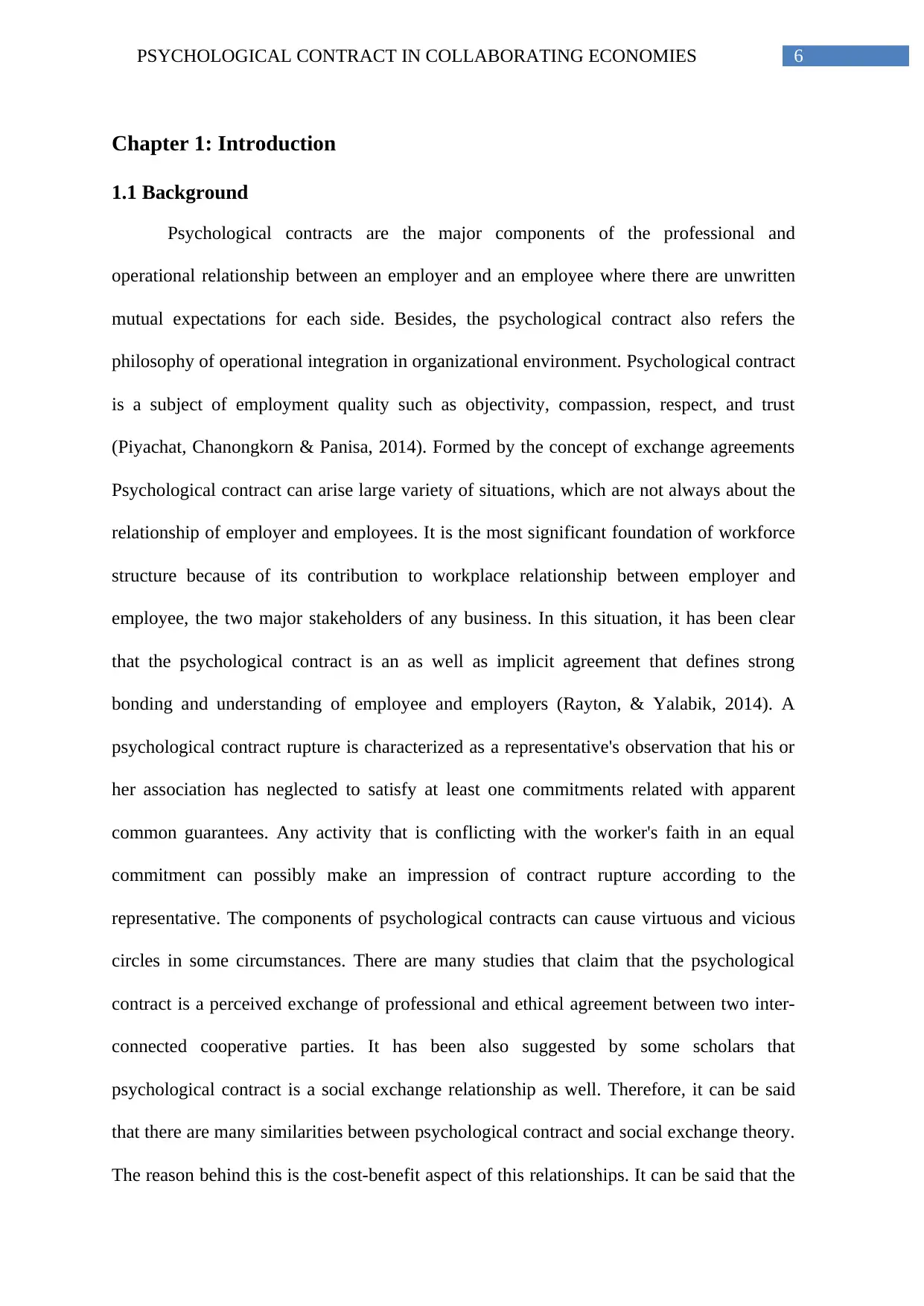
6PSYCHOLOGICAL CONTRACT IN COLLABORATING ECONOMIES
Chapter 1: Introduction
1.1 Background
Psychological contracts are the major components of the professional and
operational relationship between an employer and an employee where there are unwritten
mutual expectations for each side. Besides, the psychological contract also refers the
philosophy of operational integration in organizational environment. Psychological contract
is a subject of employment quality such as objectivity, compassion, respect, and trust
(Piyachat, Chanongkorn & Panisa, 2014). Formed by the concept of exchange agreements
Psychological contract can arise large variety of situations, which are not always about the
relationship of employer and employees. It is the most significant foundation of workforce
structure because of its contribution to workplace relationship between employer and
employee, the two major stakeholders of any business. In this situation, it has been clear
that the psychological contract is an as well as implicit agreement that defines strong
bonding and understanding of employee and employers (Rayton, & Yalabik, 2014). A
psychological contract rupture is characterized as a representative's observation that his or
her association has neglected to satisfy at least one commitments related with apparent
common guarantees. Any activity that is conflicting with the worker's faith in an equal
commitment can possibly make an impression of contract rupture according to the
representative. The components of psychological contracts can cause virtuous and vicious
circles in some circumstances. There are many studies that claim that the psychological
contract is a perceived exchange of professional and ethical agreement between two inter-
connected cooperative parties. It has been also suggested by some scholars that
psychological contract is a social exchange relationship as well. Therefore, it can be said
that there are many similarities between psychological contract and social exchange theory.
The reason behind this is the cost-benefit aspect of this relationships. It can be said that the
Chapter 1: Introduction
1.1 Background
Psychological contracts are the major components of the professional and
operational relationship between an employer and an employee where there are unwritten
mutual expectations for each side. Besides, the psychological contract also refers the
philosophy of operational integration in organizational environment. Psychological contract
is a subject of employment quality such as objectivity, compassion, respect, and trust
(Piyachat, Chanongkorn & Panisa, 2014). Formed by the concept of exchange agreements
Psychological contract can arise large variety of situations, which are not always about the
relationship of employer and employees. It is the most significant foundation of workforce
structure because of its contribution to workplace relationship between employer and
employee, the two major stakeholders of any business. In this situation, it has been clear
that the psychological contract is an as well as implicit agreement that defines strong
bonding and understanding of employee and employers (Rayton, & Yalabik, 2014). A
psychological contract rupture is characterized as a representative's observation that his or
her association has neglected to satisfy at least one commitments related with apparent
common guarantees. Any activity that is conflicting with the worker's faith in an equal
commitment can possibly make an impression of contract rupture according to the
representative. The components of psychological contracts can cause virtuous and vicious
circles in some circumstances. There are many studies that claim that the psychological
contract is a perceived exchange of professional and ethical agreement between two inter-
connected cooperative parties. It has been also suggested by some scholars that
psychological contract is a social exchange relationship as well. Therefore, it can be said
that there are many similarities between psychological contract and social exchange theory.
The reason behind this is the cost-benefit aspect of this relationships. It can be said that the
Paraphrase This Document
Need a fresh take? Get an instant paraphrase of this document with our AI Paraphraser
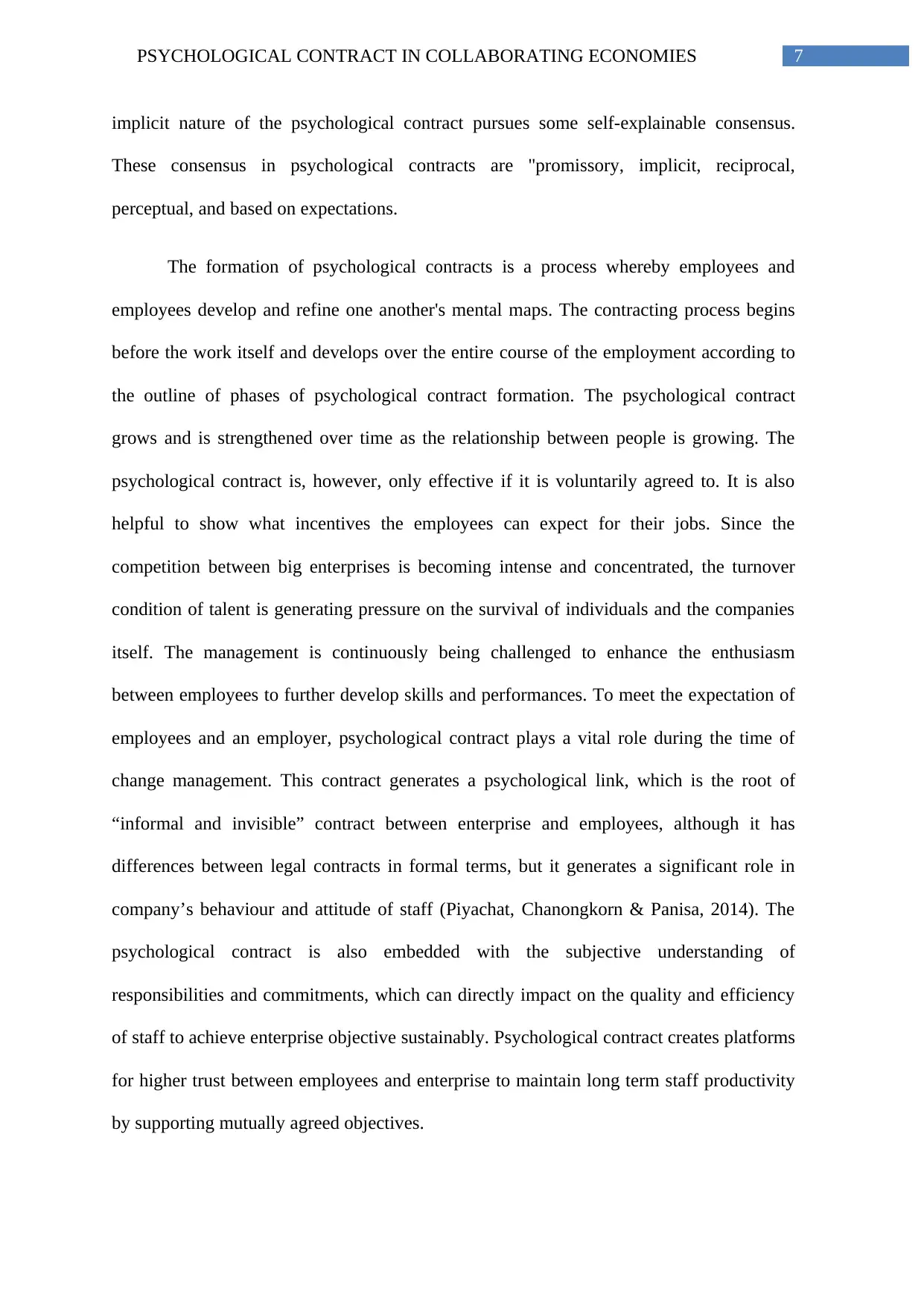
7PSYCHOLOGICAL CONTRACT IN COLLABORATING ECONOMIES
implicit nature of the psychological contract pursues some self-explainable consensus.
These consensus in psychological contracts are "promissory, implicit, reciprocal,
perceptual, and based on expectations.
The formation of psychological contracts is a process whereby employees and
employees develop and refine one another's mental maps. The contracting process begins
before the work itself and develops over the entire course of the employment according to
the outline of phases of psychological contract formation. The psychological contract
grows and is strengthened over time as the relationship between people is growing. The
psychological contract is, however, only effective if it is voluntarily agreed to. It is also
helpful to show what incentives the employees can expect for their jobs. Since the
competition between big enterprises is becoming intense and concentrated, the turnover
condition of talent is generating pressure on the survival of individuals and the companies
itself. The management is continuously being challenged to enhance the enthusiasm
between employees to further develop skills and performances. To meet the expectation of
employees and an employer, psychological contract plays a vital role during the time of
change management. This contract generates a psychological link, which is the root of
“informal and invisible” contract between enterprise and employees, although it has
differences between legal contracts in formal terms, but it generates a significant role in
company’s behaviour and attitude of staff (Piyachat, Chanongkorn & Panisa, 2014). The
psychological contract is also embedded with the subjective understanding of
responsibilities and commitments, which can directly impact on the quality and efficiency
of staff to achieve enterprise objective sustainably. Psychological contract creates platforms
for higher trust between employees and enterprise to maintain long term staff productivity
by supporting mutually agreed objectives.
implicit nature of the psychological contract pursues some self-explainable consensus.
These consensus in psychological contracts are "promissory, implicit, reciprocal,
perceptual, and based on expectations.
The formation of psychological contracts is a process whereby employees and
employees develop and refine one another's mental maps. The contracting process begins
before the work itself and develops over the entire course of the employment according to
the outline of phases of psychological contract formation. The psychological contract
grows and is strengthened over time as the relationship between people is growing. The
psychological contract is, however, only effective if it is voluntarily agreed to. It is also
helpful to show what incentives the employees can expect for their jobs. Since the
competition between big enterprises is becoming intense and concentrated, the turnover
condition of talent is generating pressure on the survival of individuals and the companies
itself. The management is continuously being challenged to enhance the enthusiasm
between employees to further develop skills and performances. To meet the expectation of
employees and an employer, psychological contract plays a vital role during the time of
change management. This contract generates a psychological link, which is the root of
“informal and invisible” contract between enterprise and employees, although it has
differences between legal contracts in formal terms, but it generates a significant role in
company’s behaviour and attitude of staff (Piyachat, Chanongkorn & Panisa, 2014). The
psychological contract is also embedded with the subjective understanding of
responsibilities and commitments, which can directly impact on the quality and efficiency
of staff to achieve enterprise objective sustainably. Psychological contract creates platforms
for higher trust between employees and enterprise to maintain long term staff productivity
by supporting mutually agreed objectives.
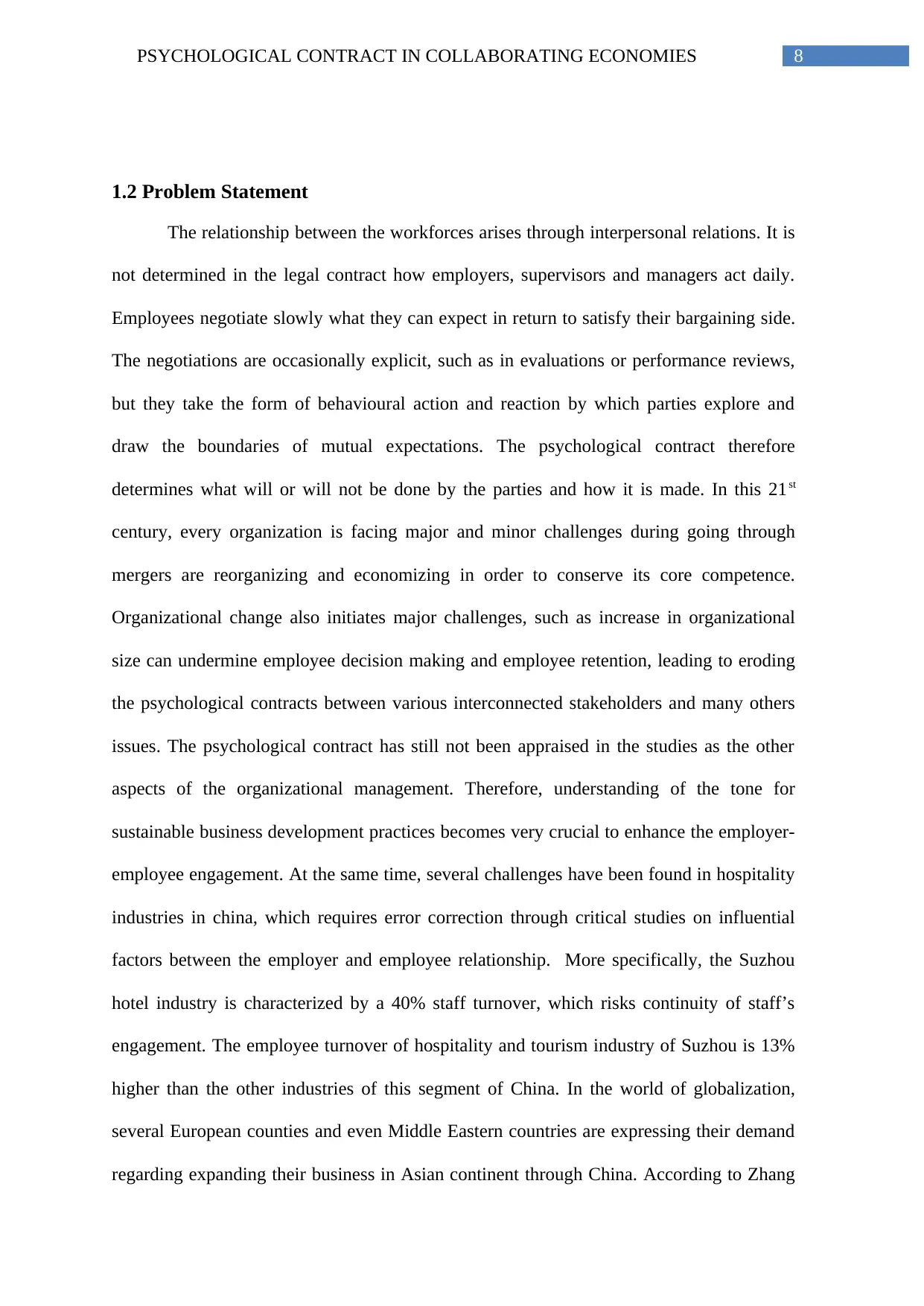
8PSYCHOLOGICAL CONTRACT IN COLLABORATING ECONOMIES
1.2 Problem Statement
The relationship between the workforces arises through interpersonal relations. It is
not determined in the legal contract how employers, supervisors and managers act daily.
Employees negotiate slowly what they can expect in return to satisfy their bargaining side.
The negotiations are occasionally explicit, such as in evaluations or performance reviews,
but they take the form of behavioural action and reaction by which parties explore and
draw the boundaries of mutual expectations. The psychological contract therefore
determines what will or will not be done by the parties and how it is made. In this 21st
century, every organization is facing major and minor challenges during going through
mergers are reorganizing and economizing in order to conserve its core competence.
Organizational change also initiates major challenges, such as increase in organizational
size can undermine employee decision making and employee retention, leading to eroding
the psychological contracts between various interconnected stakeholders and many others
issues. The psychological contract has still not been appraised in the studies as the other
aspects of the organizational management. Therefore, understanding of the tone for
sustainable business development practices becomes very crucial to enhance the employer-
employee engagement. At the same time, several challenges have been found in hospitality
industries in china, which requires error correction through critical studies on influential
factors between the employer and employee relationship. More specifically, the Suzhou
hotel industry is characterized by a 40% staff turnover, which risks continuity of staff’s
engagement. The employee turnover of hospitality and tourism industry of Suzhou is 13%
higher than the other industries of this segment of China. In the world of globalization,
several European counties and even Middle Eastern countries are expressing their demand
regarding expanding their business in Asian continent through China. According to Zhang
1.2 Problem Statement
The relationship between the workforces arises through interpersonal relations. It is
not determined in the legal contract how employers, supervisors and managers act daily.
Employees negotiate slowly what they can expect in return to satisfy their bargaining side.
The negotiations are occasionally explicit, such as in evaluations or performance reviews,
but they take the form of behavioural action and reaction by which parties explore and
draw the boundaries of mutual expectations. The psychological contract therefore
determines what will or will not be done by the parties and how it is made. In this 21st
century, every organization is facing major and minor challenges during going through
mergers are reorganizing and economizing in order to conserve its core competence.
Organizational change also initiates major challenges, such as increase in organizational
size can undermine employee decision making and employee retention, leading to eroding
the psychological contracts between various interconnected stakeholders and many others
issues. The psychological contract has still not been appraised in the studies as the other
aspects of the organizational management. Therefore, understanding of the tone for
sustainable business development practices becomes very crucial to enhance the employer-
employee engagement. At the same time, several challenges have been found in hospitality
industries in china, which requires error correction through critical studies on influential
factors between the employer and employee relationship. More specifically, the Suzhou
hotel industry is characterized by a 40% staff turnover, which risks continuity of staff’s
engagement. The employee turnover of hospitality and tourism industry of Suzhou is 13%
higher than the other industries of this segment of China. In the world of globalization,
several European counties and even Middle Eastern countries are expressing their demand
regarding expanding their business in Asian continent through China. According to Zhang
⊘ This is a preview!⊘
Do you want full access?
Subscribe today to unlock all pages.

Trusted by 1+ million students worldwide
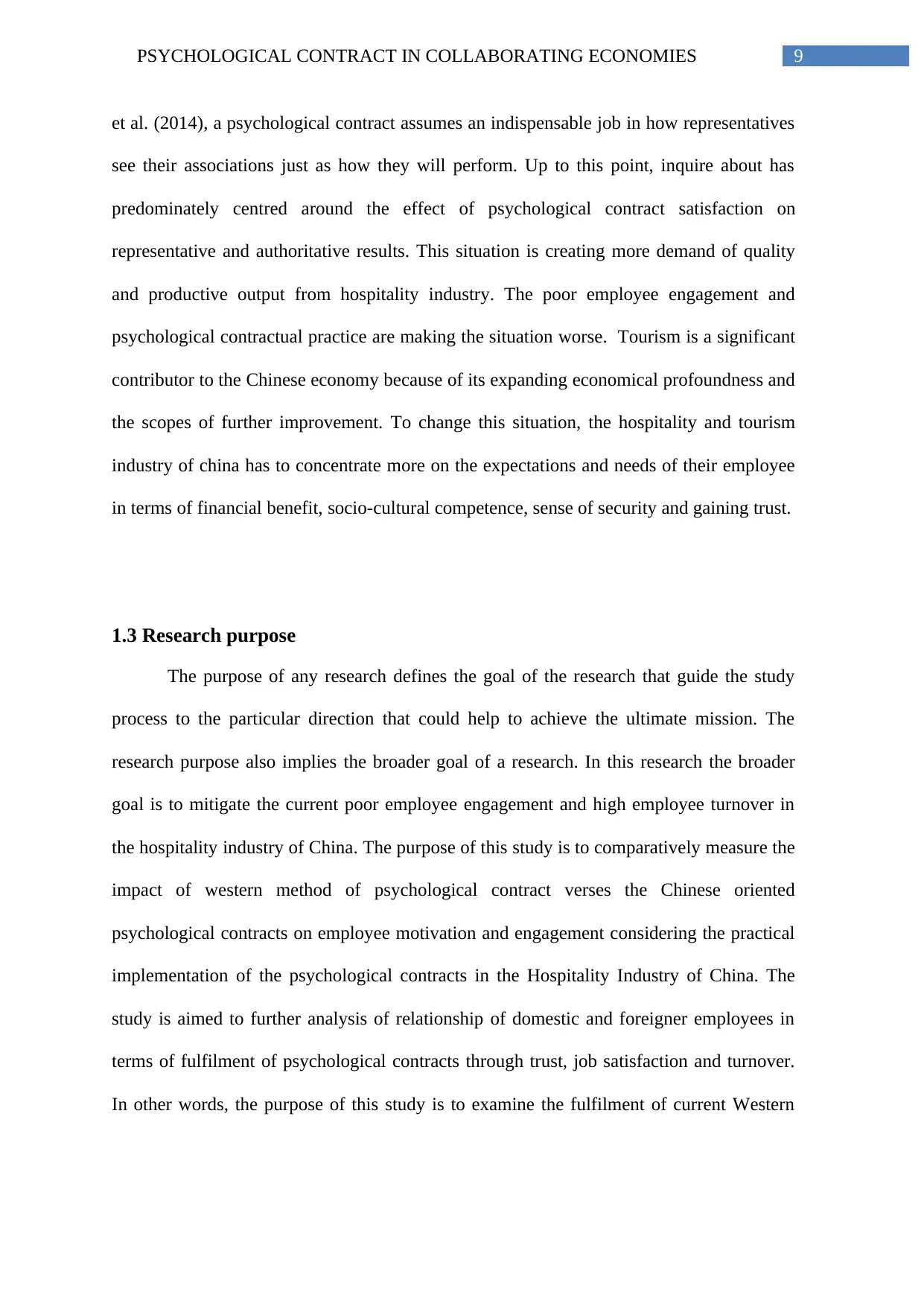
9PSYCHOLOGICAL CONTRACT IN COLLABORATING ECONOMIES
et al. (2014), a psychological contract assumes an indispensable job in how representatives
see their associations just as how they will perform. Up to this point, inquire about has
predominately centred around the effect of psychological contract satisfaction on
representative and authoritative results. This situation is creating more demand of quality
and productive output from hospitality industry. The poor employee engagement and
psychological contractual practice are making the situation worse. Tourism is a significant
contributor to the Chinese economy because of its expanding economical profoundness and
the scopes of further improvement. To change this situation, the hospitality and tourism
industry of china has to concentrate more on the expectations and needs of their employee
in terms of financial benefit, socio-cultural competence, sense of security and gaining trust.
1.3 Research purpose
The purpose of any research defines the goal of the research that guide the study
process to the particular direction that could help to achieve the ultimate mission. The
research purpose also implies the broader goal of a research. In this research the broader
goal is to mitigate the current poor employee engagement and high employee turnover in
the hospitality industry of China. The purpose of this study is to comparatively measure the
impact of western method of psychological contract verses the Chinese oriented
psychological contracts on employee motivation and engagement considering the practical
implementation of the psychological contracts in the Hospitality Industry of China. The
study is aimed to further analysis of relationship of domestic and foreigner employees in
terms of fulfilment of psychological contracts through trust, job satisfaction and turnover.
In other words, the purpose of this study is to examine the fulfilment of current Western
et al. (2014), a psychological contract assumes an indispensable job in how representatives
see their associations just as how they will perform. Up to this point, inquire about has
predominately centred around the effect of psychological contract satisfaction on
representative and authoritative results. This situation is creating more demand of quality
and productive output from hospitality industry. The poor employee engagement and
psychological contractual practice are making the situation worse. Tourism is a significant
contributor to the Chinese economy because of its expanding economical profoundness and
the scopes of further improvement. To change this situation, the hospitality and tourism
industry of china has to concentrate more on the expectations and needs of their employee
in terms of financial benefit, socio-cultural competence, sense of security and gaining trust.
1.3 Research purpose
The purpose of any research defines the goal of the research that guide the study
process to the particular direction that could help to achieve the ultimate mission. The
research purpose also implies the broader goal of a research. In this research the broader
goal is to mitigate the current poor employee engagement and high employee turnover in
the hospitality industry of China. The purpose of this study is to comparatively measure the
impact of western method of psychological contract verses the Chinese oriented
psychological contracts on employee motivation and engagement considering the practical
implementation of the psychological contracts in the Hospitality Industry of China. The
study is aimed to further analysis of relationship of domestic and foreigner employees in
terms of fulfilment of psychological contracts through trust, job satisfaction and turnover.
In other words, the purpose of this study is to examine the fulfilment of current Western
Paraphrase This Document
Need a fresh take? Get an instant paraphrase of this document with our AI Paraphraser
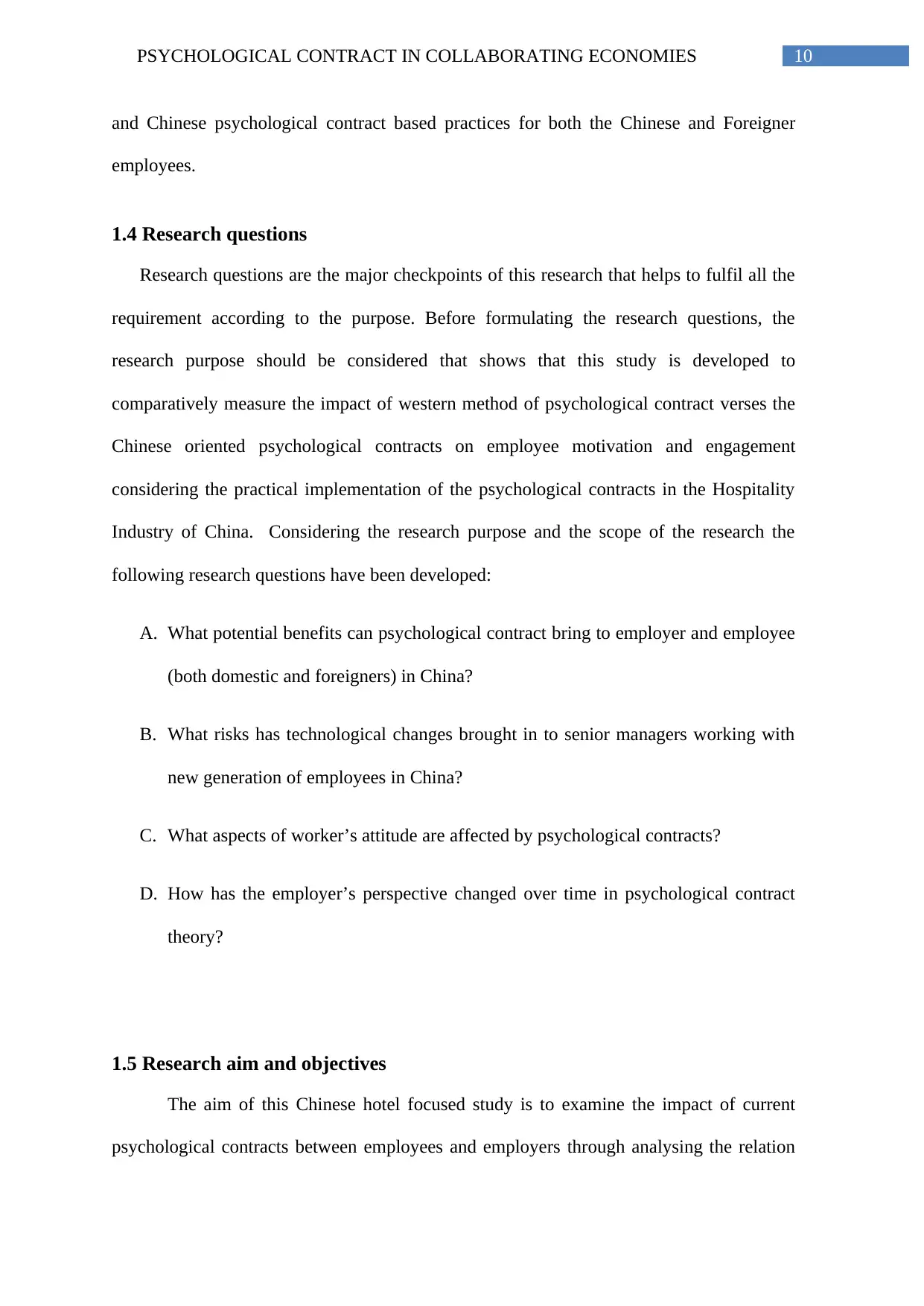
10PSYCHOLOGICAL CONTRACT IN COLLABORATING ECONOMIES
and Chinese psychological contract based practices for both the Chinese and Foreigner
employees.
1.4 Research questions
Research questions are the major checkpoints of this research that helps to fulfil all the
requirement according to the purpose. Before formulating the research questions, the
research purpose should be considered that shows that this study is developed to
comparatively measure the impact of western method of psychological contract verses the
Chinese oriented psychological contracts on employee motivation and engagement
considering the practical implementation of the psychological contracts in the Hospitality
Industry of China. Considering the research purpose and the scope of the research the
following research questions have been developed:
A. What potential benefits can psychological contract bring to employer and employee
(both domestic and foreigners) in China?
B. What risks has technological changes brought in to senior managers working with
new generation of employees in China?
C. What aspects of worker’s attitude are affected by psychological contracts?
D. How has the employer’s perspective changed over time in psychological contract
theory?
1.5 Research aim and objectives
The aim of this Chinese hotel focused study is to examine the impact of current
psychological contracts between employees and employers through analysing the relation
and Chinese psychological contract based practices for both the Chinese and Foreigner
employees.
1.4 Research questions
Research questions are the major checkpoints of this research that helps to fulfil all the
requirement according to the purpose. Before formulating the research questions, the
research purpose should be considered that shows that this study is developed to
comparatively measure the impact of western method of psychological contract verses the
Chinese oriented psychological contracts on employee motivation and engagement
considering the practical implementation of the psychological contracts in the Hospitality
Industry of China. Considering the research purpose and the scope of the research the
following research questions have been developed:
A. What potential benefits can psychological contract bring to employer and employee
(both domestic and foreigners) in China?
B. What risks has technological changes brought in to senior managers working with
new generation of employees in China?
C. What aspects of worker’s attitude are affected by psychological contracts?
D. How has the employer’s perspective changed over time in psychological contract
theory?
1.5 Research aim and objectives
The aim of this Chinese hotel focused study is to examine the impact of current
psychological contracts between employees and employers through analysing the relation
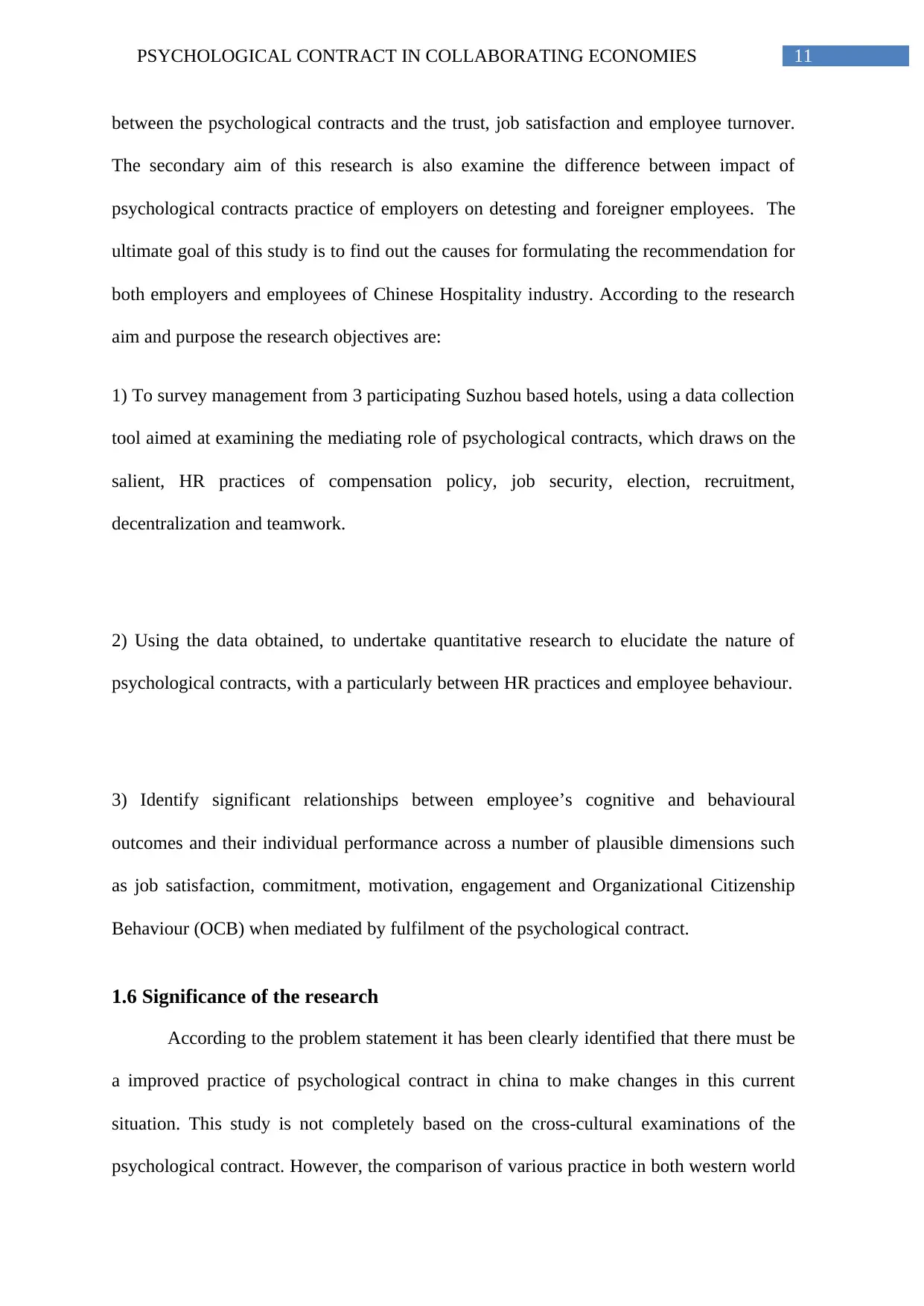
11PSYCHOLOGICAL CONTRACT IN COLLABORATING ECONOMIES
between the psychological contracts and the trust, job satisfaction and employee turnover.
The secondary aim of this research is also examine the difference between impact of
psychological contracts practice of employers on detesting and foreigner employees. The
ultimate goal of this study is to find out the causes for formulating the recommendation for
both employers and employees of Chinese Hospitality industry. According to the research
aim and purpose the research objectives are:
1) To survey management from 3 participating Suzhou based hotels, using a data collection
tool aimed at examining the mediating role of psychological contracts, which draws on the
salient, HR practices of compensation policy, job security, election, recruitment,
decentralization and teamwork.
2) Using the data obtained, to undertake quantitative research to elucidate the nature of
psychological contracts, with a particularly between HR practices and employee behaviour.
3) Identify significant relationships between employee’s cognitive and behavioural
outcomes and their individual performance across a number of plausible dimensions such
as job satisfaction, commitment, motivation, engagement and Organizational Citizenship
Behaviour (OCB) when mediated by fulfilment of the psychological contract.
1.6 Significance of the research
According to the problem statement it has been clearly identified that there must be
a improved practice of psychological contract in china to make changes in this current
situation. This study is not completely based on the cross-cultural examinations of the
psychological contract. However, the comparison of various practice in both western world
between the psychological contracts and the trust, job satisfaction and employee turnover.
The secondary aim of this research is also examine the difference between impact of
psychological contracts practice of employers on detesting and foreigner employees. The
ultimate goal of this study is to find out the causes for formulating the recommendation for
both employers and employees of Chinese Hospitality industry. According to the research
aim and purpose the research objectives are:
1) To survey management from 3 participating Suzhou based hotels, using a data collection
tool aimed at examining the mediating role of psychological contracts, which draws on the
salient, HR practices of compensation policy, job security, election, recruitment,
decentralization and teamwork.
2) Using the data obtained, to undertake quantitative research to elucidate the nature of
psychological contracts, with a particularly between HR practices and employee behaviour.
3) Identify significant relationships between employee’s cognitive and behavioural
outcomes and their individual performance across a number of plausible dimensions such
as job satisfaction, commitment, motivation, engagement and Organizational Citizenship
Behaviour (OCB) when mediated by fulfilment of the psychological contract.
1.6 Significance of the research
According to the problem statement it has been clearly identified that there must be
a improved practice of psychological contract in china to make changes in this current
situation. This study is not completely based on the cross-cultural examinations of the
psychological contract. However, the comparison of various practice in both western world
⊘ This is a preview!⊘
Do you want full access?
Subscribe today to unlock all pages.

Trusted by 1+ million students worldwide
1 out of 82
Your All-in-One AI-Powered Toolkit for Academic Success.
+13062052269
info@desklib.com
Available 24*7 on WhatsApp / Email
![[object Object]](/_next/static/media/star-bottom.7253800d.svg)
Unlock your academic potential
Copyright © 2020–2026 A2Z Services. All Rights Reserved. Developed and managed by ZUCOL.